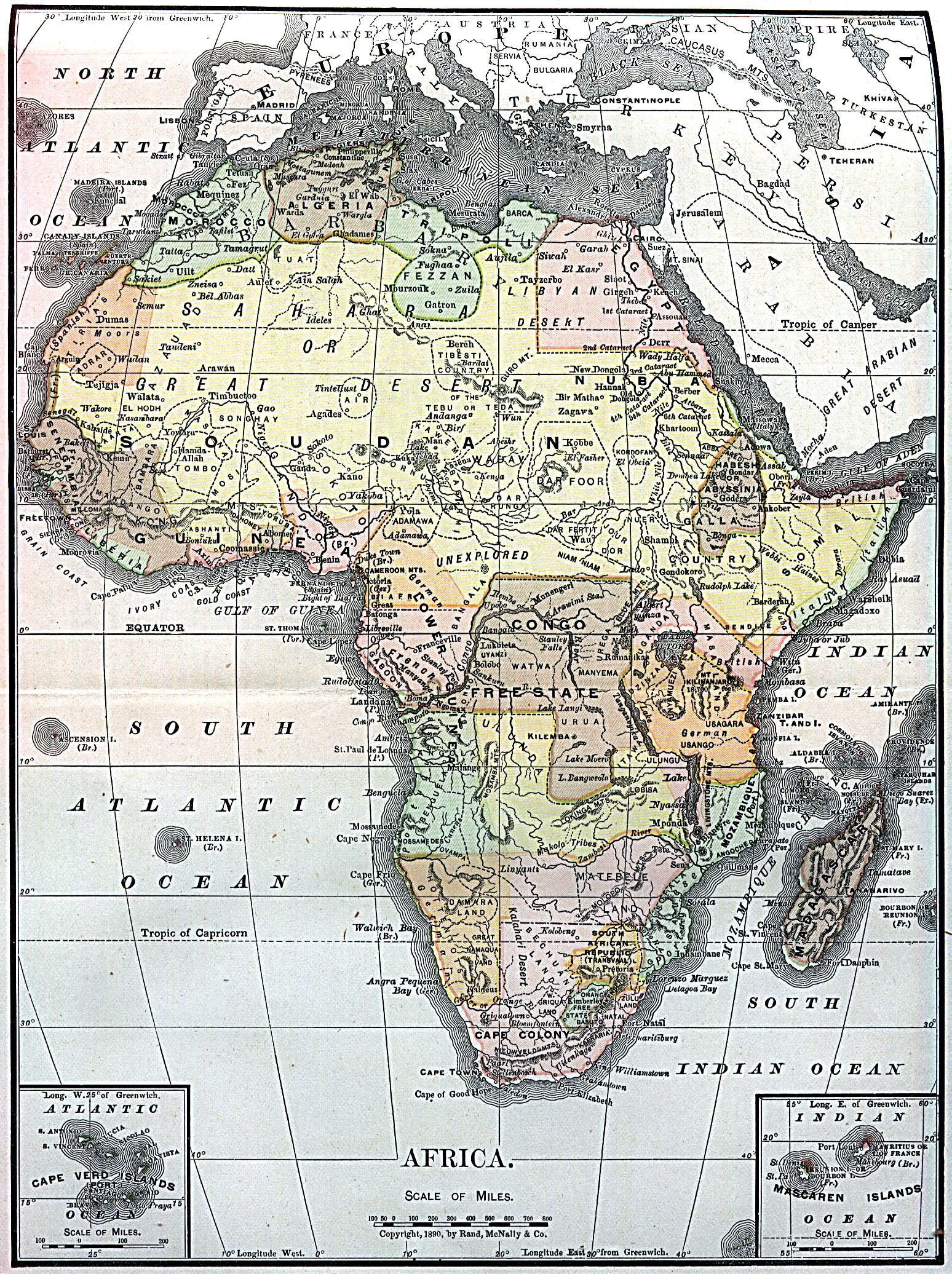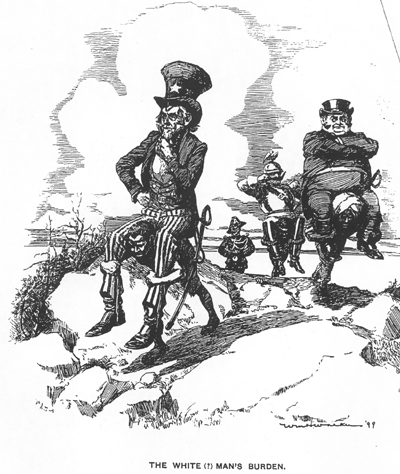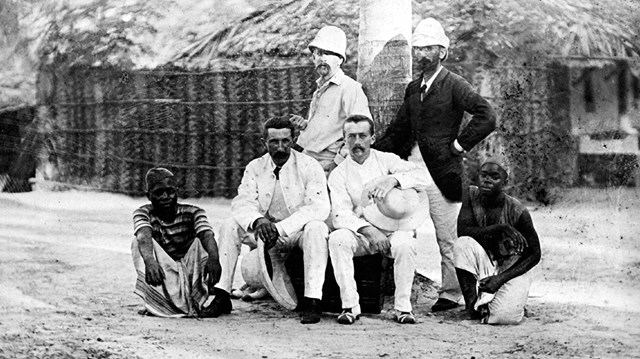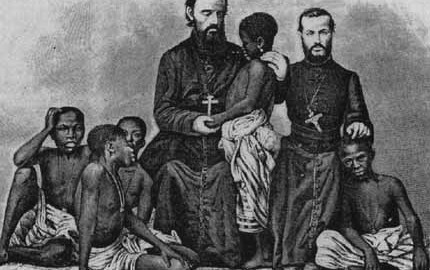Overview
As the imperial powers of Europe set their sights on new geographic regions to expand their spheres of influence in the 19th century, Africa emerged as a prime location for colonization due to its wealth of natural resources and purportedly undeveloped economies ripe for exploitation. In reality, European colonization devastated traditional African societies and economies. However, the leaders spearheading the movement cited the “white man’s burden,” a term popularized in Rudyard Kipling’s poem to morally justify imperialist expansion. The philosophy underpinning the “White Man’s Burden” consisted of the “Three C’s of Colonialism: Civilization, Christianity, and Commerce.”

http://www.lib.utexas.edu/maps/historical/africa_1890.jpg
Civilization:
In 1884, the Berlin Conference marked the official beginning of colonialism in Africa. One of the justifying principles behind colonialism was the need to civilize the purportedly backward peoples of Africa. Fifteen years following the Berlin Conference, the supposed imperative of civilizing non-whites was expressed in Rudyard Kipling’s poem published in 1899 in McClure’s Magazine entitled “White Man’s Burden”:
To seek another’s profit
And work another’s gain
Take up the White Man’s burden—
And reap his old reward:
The blame of those ye better
The hate of those ye guard—
The cry of hosts ye humour
(Ah slowly) to the light:
“Why brought ye us from bondage,
“Our loved Egyptian night?”
The idea of the White Man’s Burden was to better (“seek another’s profit”) an ostensibly backward people (anyone who was not white). The lines following this initial declaration reveal the prevailing attitude in regards to how such a civilizing mission would proceed. Kipling bemoans that the African people will come “slowly to the light” and would lament their release from “bondage.” In essence, Kipling believed that these non-white racial groups were so backward that they would be unable to comprehend the benefits of Europeanization. It was Kipling’s belief that Africans must be pulled toward the “light” in order to see the error of their, in his view, savage nature.
The sentiments expressed in “White Man’s Burden” were not uncommon during this time. Africans were considered culturally inferior, an idea that was supported by scientific racism. According to a lecture given the USA, 35 years before the official start of colonialism, the so-called inferiority of Africans was evident in the “deep-rooted intellectual and physical differences seen around us, in the White, Red, and Black Races, are too obvious and too important in their bearings, to be longer overlooked…”(Nott 3). The speaker, Dr. Nott, a medical doctor, goes on to assert that the black, white, and “red” races are categorically different from one another and could not possibly be related. Dr. Nott gave this lecture in the United States 35 years before the official beginning of colonialism. However, the same ideas, the same ideological belief in the inferiority of Africans and call toward a European view of civilization remained, as white settlers began to claim swathes of Africa for their homeland’s possession. Towards the end of his speech, Dr.Nott states that Africans are incapable of civilizing themselves: “There Africa stands with her fifty millions of blacks, and there she has stood for the last five thousand years, with this people occupying the same countries, without one step towards civilizations; and all the experiments in the United States, the West Indies, &e., have failed” (Nott 19-20).
Ultimately, these mentalities led to a violent, forceful takeover (Conklin 230-231). However, prior to this the idea existed that Europeans had a responsibility to colonize and therefore civilize Africans (12). The idea of civilization was “the triumph and development of reason, not only in the constitutional, political, and administrative domains, but in the moral, religious, and intellectual spheres… the essence of French achievements compared to the uncivilized world of savages, slaves, and barbarians” (14). In France, this idea was followed by a campaign to popularize ideas about Africans’ lack of civilization through educational and media materials (13-14). Practically, this was carried out in the colonies through increasing infrastructure, public health campaigns, education, and political reform (38-39; 73-74). Unfortunately, the eventual result of this was the use of coercive measures, including forced labor and violence that would ultimately cripple the continent (230-231).

https://en.wikipedia.org/wiki/The_White_Man%27s_Burden#/media/File:The_white_mans_burden.gif
Christianity:
Christianity was one justification that European powers used to colonize and exploit Africa. Through the dissemination of Christian doctrine, European nations such as Great Britain, France, and the Netherlands sought to educate and reform African culture. In his book A History of Africa, scholar J.D. Fage describes the racially based logic of European intellectuals and missionaries saying: “Mid-and late-nineteenth-century Europeans were generally convinced that their Christian, scientific and industrial society was intrinsically far superior to anything that Africa had produced”(Fage 322). Unfamiliar with the diverse cultures on the continent of Africa, European explorers viewed practices unfamiliar to them as lesser and savage.
To many European nations, Christianity represented western civilization and the basis for Anglo-Saxon morality. Christianity served as a major force in the partition and eventual colonization of Africa (Boahen 12). During the late 19th century, European nations increasingly vied for global power. In an attempt to augment political and regional influence, nations like Great Britain and France needed a justification for expansion.
Essentially Christianity was a guise by which Western governments justified the exploitation and conquest of African nations. In the poem The White Man’s Burden, poet Rudyard Kipling exclaims, “ Take up the White Man’s burden, The savage wars of peace—Fill full the mouth of Famine and bid the sickness cease”.Originally denoted as a reference to United States imperialism in the Philippines, the Anglos-centric basis of the poem holds true to the root structure of imperialist ideology. Denouncing the religious practices of Africans as witchcraft and heathenism, European nations sought to convert, and then exploit the indigenous peoples of Africa.
In Kipling’s poem, the lines, “Your new-caught sullen peoples, Half-devil and half-child” refer to the European belief that Africans were heathens, resigned to live a life of savagery. Furthermore European missionaries called upon the tenants of Christianity to spread what they believed was a just and compassionate doctrine. In practice they were used to degrade the culture and society of the African people. Under the pretense of humanitarian theology, European powers strategically implemented Christianity as a divisive imperialistic tool.
In a missionary memoir written by monk named Daniel Kumler Flickinger, Flickinger describes the state of African culture, religion, and society in the nation of Ethiopia. In a chapter entitled Evangelization—Its Difficulties Flickinger states, “The only reason why our theological views are not as foolish and corrupting as theirs (Ethiopians), and that we are not believers in witchcraft, devil-worship, and a thousand other foolish things, is simply because the light of Heaven shines upon us”(84). Flickinger articulates an argument used by Christian missionaries to justify the exploitative and coercive tactics implemented by European nations.

http://www.christianitytoday.com/images/36056.jpg?w=640
Commerce:
While European powers justified colonialism in Africa as a moral obligation to bestow modern civilization and Christianity on African societies, the potential for commerce and natural resources provided the true impetus for the colonization of Africa. Following the abolition of the British slave trade in 1807 and the decline of trade with the United States in the mid-1800s for the same reason, Africa represented to Europe a recently legitimized and untapped region for economic expansion (Lugard 69-75). To further compound the potential for aggressive competition, the industrial revolution and mechanization of European industries ignited an unprecedented demand for natural resources. The abundance of raw materials available Africa (such as rubber, minerals, and oil) thus emerged as a viable solution to fuel the burgeoning industry of European factories. This amalgamation of factors drove Europe, into a race to claim territory and obtain raw materials in what became known as the “Scramble for Africa.” (Gain & Duigan)
While European and African merchants had established trade partnerships prior to colonialism, European trade companies, often funded by colonial governments, served as the initial primary agents for economic expansion. The untapped wealth of natural resources provided the incentive for these trade companies to aggressively establish economic control over African territories. These first attempts at establishing control were met with mixed success, but the individuals upon their return to Europe effectively employed nationalistic rhetoric to lobby for increased government support. Upon being expelled from the Ugandan kingdom of Bunyoro, the British explorer published The Rise of our East African Empire, in which he justifies the colonization of Africa as an imperialistic and economic obligation:
“It is sufficient to reiterate here that, as long as our policy is one of free trade, we are compelled to seek new markets; To allow other nations to develop new fields, and to refuse to do so ourselves, is to go backward;… We owe to the instincts of colonial expansion of our ancestors those vast and noble dependencies which are our pride and the outlets of our trade today; and we are accountable to posterity that opportunities which now present themselves of extending the sphere of our industrial enterprise are not neglected.” (Lugard 69-75)
The lobbying efforts and publications of memoirs successfully garnered national support for the establishment of colonies. Another equally important economic incentive drove the effort of colonial expansion. As the volume of factory goods skyrocketed with the development of industrialization, European demand could not match the rapid rate of production. Author Jules Ferry states, “the policy of colonial expansion, as seen from the perspective of a need, felt more and more urgently by the industrialized population of Europe and especially the people of our rich and hardworking country of France: the need for outlets [for exports].”(Ferry, “Speech Before the French Chamber of Deputies”)
European powers responded by flooding their African colonies with European exported goods to match the volume of production, and as a result, the domestic African industries were driven out of competition (Gann and Duigan).
While the administrative policies varied between the different colonies, the system of traditional African economies were completely uprooted and exploited by colonialism. In its most extreme form, such as the case of the Congo under the Belgium rule of King Leopold, the European powers erected “extractive states.” In this notorious example, the population was stripped of all private property and forced into labor with the sole purpose of extracting and supplying as much of the colony’s resources as possible to the colonizer. In addition to disrupting traditional African industries and forms of agriculture, the Europeans did little to foster the development of trade between African states. This exploitation produced far-reaching consequences, as African societies often remained economically dependent states long after their independence (Acemooglu, Simon, and Robinson).

http://www.heritage-explorer.co.uk/file/he/content/upload/database/2379_450.jpg
Citations:
J.D. Fage, A History of Africa Third Edition, 1995 11 New Fetter Lane London.
Adu Boahen General History of Africa VII: Africa under Colonial Domination 1880-1935 , University of California Press 2120 Berkeley Way, Berkley California.
Rev D.K. Flickinger Ethiopia; Twenty Years of missionary Life in Western Africa.Dayton Ohio: United Brethren Publish House 1877.
Nott, J. C. (1851). An Essay on the Natural History of Mankind. Ann Arbor: ProQuest I&L Research Collections, Dade, Thompson & co. Retrieved from http://search.proquest.com/docview/88430679?accountid=10747
Kipling, Rudyard (1899, 02). The White Man’s Burden. McClure’s Magazine (1893-1926), OL. XII., 2. Retrieved from http://search.proquest.com/docview/135628529?accountid=10747
Conklin, Alice L. A Mission to Civilize : The Republican Idea of Empire in France and West Africa, 1895-1930. Stanford, Calif.: Stanford UP, 1997. Print.
D. Lugard, The Rise of Our East African Empire, (Edinburgh, 1893), I.585-587, II.69-75.
Gann, Lewis H., and Peter Duignan. “Introduction.” Colonialism in Africa, 1870-1960. London: Cambridge U.P., 1969. N. pag. Print.
Jules François Camille Ferry, “Speech Before the French Chamber of Deputies, March 28, 1884,” Discours et Opinions de Jules Ferry.
Acemoglu, Daron, Johson, Simon, and Robinson, James A., “The Colonial Origins of Comparative Development: An Empirical Investigation.” National Bureau of Economic Research. June 2000.
